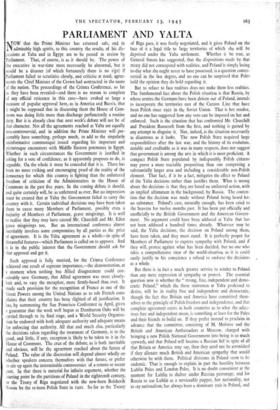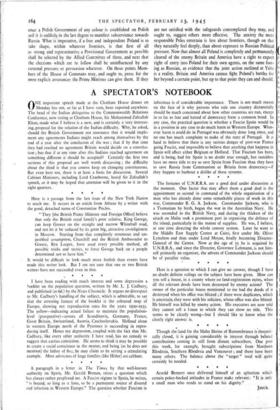PARLIAMENT AND YALTA
NOW that the Prime Minister has returned safe, and in admirably high spirits, to this country the results of his dis- cussions at Yalta and in Egypt are to be passed in review by Parliament. That, of course, is as it should be. The power of the executive in war-time must necessarily be abnormal, but it would be a disaster (of which fortunately there is no sign) if Parliament failed to scrutinise closely, and criticise at need, agree- ments the Chief Minister of the Crown had eontracted in the name of the nation. The proceedings of the Crimea Conference, so far as they have been revealed—and there is no reason to complain of any official reticence in this case—have evoked so large a measure of popular approval here, as in America and Russia, that it might be supposed that in discussing them the House of Com- mons was doing little more than discharge perfunctorily a routine duty. But it is already clear that next week's debate will not be of that character. Not all the agreements reached at Yalta are equally non-controversial, and in addition the Prime Minister will pre- sumably have something, perhaps much, to add to the singularly uninformative communiqué issued regarding his important and picturesque encounters with Middle Eastern potentates in Egypt. Whether in such circumstances the Government is justified in asking for a vote of confidence, as it apparently proposes to do, is arguable. On the whole it must be conceded that it is. There has been no more sviking and encouraging proof of the reality of the democracy for which this country is fighting than the unfettered freedom of criticism of the Administration in the House of Commons in the past five years. In the coming debate it should, and quite certainly will, be as unfettered as ever. But no impression must be created that at Yalta the Government failed to carry the country with it. Certain individual 'decisions may have been taken there to cause many Members of Parliament, possibly even a majority of Members - of Parliament, _grave misgivings. It is well to realise that they may have caused Mr. Churchill and Mr. Eden grave misgivings too. But an international conference almost Inevitably involves some compromises by all parties as the price of agreement. It is the Yalta agreement as a whole—in spite of distasteful features—which Parliament is called on to approve.. And it is in the public interest that the Government should ask for that approval and get it.
Such approval is fully merited, for the Crimea Conference achieved one result of supreme importance,—the demonstration, at a moment when nothing but Allied disagreement could con- ceivably save Germany, that Allied agreement was more closely- knit and, to vary the metaphor, more firmly-based than ever. It made such provision for the recognition of France as one of the Great Powers among the United Nations as to rob French com- plaints that their country has been slighted of all justification. It has, by summoning the San Francisco Conference in, April, given a guarantee that the work well begun at Dumbarton Oaks will be carried through to its final stage, and a World Security Organisa- tion be endowed with both adequate authority and adequate means for enforcing that authority. All that and much else, particularly the decisions taken regarding the treatment of Germany, is to the good, and little, if any, exception is likely to be taken to it in the House of Commons. The crux of the debate, as is both inevitable and obvious, will be the agreement reached about the future of Poland. The value of the discussion will depend almost wholly on whether speakers concern themselves with that future, or prefer to stir up again the interminable controversies of a remote or recent past. In that there is material for infinite argument, whether the starting point be the partitions of Poland in the eighteenth century, or the Treaty of Riga negotiated with the new-born Bolshevik Russia by the re-born Polish State in 1921. So far as the Treaty of Riga goes, it was freely negotiated, and it gives Poland on the face of it a legal title to large territories of which she will be deprived under the Yalta settlement. Whether it be true, as General Smuts has suggested, that the dispositions made by that treaty did not correspond with realities, and Poland is simply losing to-day what she ought never to have possessed, is a question contro- versial in the last degree, and no one can be surprised that Poles hold the opinion they do hold regarding it.
But to refuse to face realities does not make them less realities. The fundamental fact about the Polish situation is that Russia, by whose armies the Germans have been driven out of Poland, intends to incorporate the territories east of the Curzon Line that have been Polish since 1921 in the Soviet Union. That is her resolve, and no one has suggested how any veto can be imposed on her and enforced. Such is the situation that has confronted Mr. Churchill and President Roosevelt from the first, and nothing is gained by any attempt to disguise it. Nor, indeed, is the situation necessarily as disastrous as it looks. The new Polish State acquired large responsibilities after the last war, and the history of its evolution, notable and creditable as it was in many respects, does not suggest that government is among the arts in which it is most proficient. A compact Polish State populated by indisputably Polish citizens may prove a more tractable proposition than one comprising a substantially larger area and including a considerable non-Polish element. That fact, if it be a fact, mitigates the effect to Poland of the Yalta decisions rather than justifies them. What is wrong about the decisions is that they are based on unilateral action, with an implied ultimatum in the background, by Russia. The conten- tion that the decision was made without Poland being heard has no substance. Poland's case, naturally enough, has been cried to the heavens for twelve months past. It has been put officially and unofficially to the British Government and the American Govern- ment. No argument could have been adduced at Yalta that has not been adduced a hundred times. already. Whatever may be said, the Yalta decisions, the decision on Poland among them, have been taken, and they must stand. It is perfectly proper for Members of Parliament to express sympathy with Poland, and if they will, protest against what has been decided, but no one who takes a comprehensive view of the world-situation as it is could easily justify to his conscience a refusal to endorse the decisions as a whole.
But there is in fact a much greater service to render to Poland than any mere expression of sympathy or protest. The essential question now is whether the "strong, free, independent and demo- cratic Poland," which the three statesmen at Yalta professed to desire, Will be in reality free and independent and democratic, though the fact that Britain and America have committed them- selves to the principle of Polish freedom and independence, and that complete agreement exists in both countries as to what the adjec- tives free and independent mean, is something at least for the Poles and their friends to build on. If they prefer instead to proclaim in advance that the committee, consisting of M. Molotov and the British and American Ambassadors at Moscow, charged with bringing a new Polish National Government into being is so much eyewash, and that Poland will become a Russian fief in spite of all that Britain or America may say, then they need not be astonished if they alienate much British and American sympathy that would otherwise be with them. Political divisions in Poland seem to be endemic. That is enough to explain in part the hostility between Lublin Poles and London Poles. It is no doubt convenient at the moment for Lublin to shelter under Russian patronage, and for Russia to use Lublin as a serviceable puppet, but nationality, not to say nationalism, has always been a dominant trait in Poland, and once a Polish Government of any colour is established on Polish soil it is unlikely in the last degree to manifest subservience towards Russia. What is imperative, if a free and independent Poland is to take shape, within whatever frontiers, is that first of all as strong and representative a Provisional Government as possible shall be selected by the Allied Committee of three, and next that the elections which are to follow shall be uninfluenced by any external pressure or persuasion whatever. On those points Mem- bers of the House of Commans may, and ought to, press for the most explicit assurances the Prime Minister can give them. If they are not satisfied with the safeguards contemplated they may, and ought to, suggest others more effective. The anxiety the more responsible Poles entertain is less about frontiers, though on that they naturally feel deeply, than about exposure to Russian Political pressure. Now that almost all Poland is completely and permanently cleared of the enemy Britain and America have a right to expect right of entry into Poland for their own agents, on the same foot- ing as Russian, as evidence that the joint action outlined at Yalta is a reality. Britain and America cannot fight Poland's battles for her beyond a certain point, but up to that point they can and should.



























 Previous page
Previous page